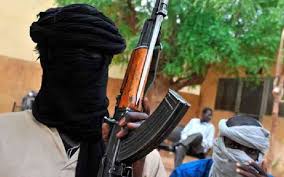The Mahmuda terror group has reportedly formed a parallel government inside the forests of Kwara and Niger States.
According to Emir of Yashikira, Dr. Umar Sariki Usman, the militants now enforce laws, taxes, and land allocations.
He confirmed their presence in Kainji Lake National Park, affecting Baruten, Kaiama, and border areas of Niger State.
“They have laws, collect Zakat, and decide land ownership within their controlled forest areas,” the Emir said on Monday.
He warned the Mahmuda terror group remains active, despite claims of their disappearance, and still conducts deadly ambush attacks.
Security reports say Mahmuda terror group members killed over 15 people during an assault on vigilantes in Kemanji.
A voice note from the group’s leader threatened violence, kidnappings, and extortion across rural areas under their control.
The terror group now dominates Babana and Wawa districts in Niger, spreading fear throughout surrounding Kwara border communities.
Villages like Nuku, Nanu, and Tenebo suffer direct consequences from the Mahmuda terror group’s reign in the national park.
Residents say the group exploits the park’s ungoverned status to run illegal logging, taxation, and criminal ransom schemes.
Local sources revealed that timber merchants negotiated access with the militants in exchange for unhindered logging operations.
One source explained that militants, hunters, and loggers have formed an underground economy benefiting from state security gaps.
Security analysts warned that Mahmuda terror group’s rise signals broader threats to Nigeria’s stability and ungoverned forest territories.
They stressed urgent need for surveillance, joint task force action, and strategic deployment to reclaim occupied forests from terrorists.
Experts fear continued militant occupation could deepen poverty, destroy livelihoods, and fuel displacement across rural Northern Nigeria communities.
The Mahmuda terror group’s actions expose national vulnerabilities and demand immediate response from federal authorities and relevant security agencies.




































